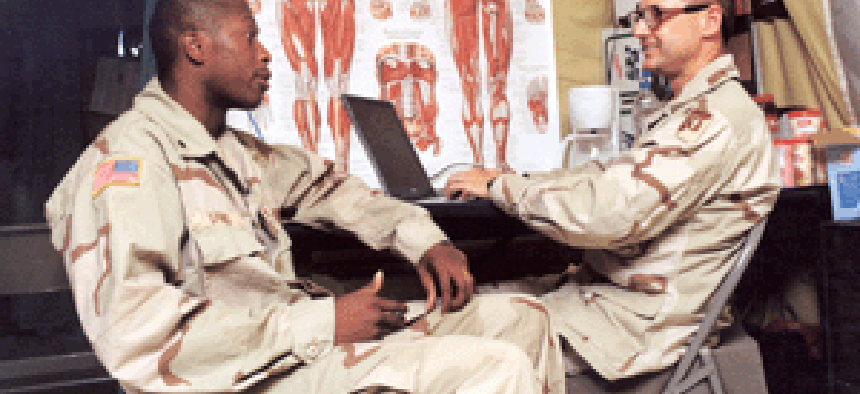Network-centric warfare in action: Northrop Grumman's Theater Medical Information Program

For Northrop Grumman Corp., Los Angeles, Operation Iraqi Freedom provided an opportunity to deploy its Theatre Medical Information Program, a framework for moving patient data around different echelons of the Army.
For Northrop Grumman Corp., Los Angeles, Operation Iraqi Freedom provided an opportunity to deploy its Theatre Medical Information Program, a framework for moving patient data around different echelons of the Army.Although originally commissioned for one purpose, the system shows how information technology can be used to serve multiple duties. By having a framework to move medical data throughout the service's classified SIPRNET, or Secret Internet Protocol Router Network, the Army can reuse and analyze medical information, said Andrew Hunt, the system's chief architect.Injury information collected on the field can be transmitted to medical centers and hospitals, eliminating the need to recollect data as the soldier moves from facility to facility. The data can also be aggregated to provide up-to-date readiness data to commanders."TMIP's main mission is to provide interoperable medical information systems in the theater," Hunt said.The project came about following the 1991 Gulf War when returning veterans complained of an illness known as the Gulf War Syndrome, but the military didn't have sufficient data to investigate their claims. Northrop Grumman won a contract in September 1997 to build a system that could track symptoms of soldiers in the field. The company now supports TMIP under a 2001 task order worth $12.7 million. The company built TMIP as a proof-of-concept system and was testing it when the Defense Department sent forces to Afghanistan. The Office of the Surgeon General pushed to make the system operational, so it was rapidly fielded in Afghanistan and, afterwards, pressed into service in Iraq, where five medical brigades, 10 combat hospitals and 25 other field facilities have used it. Built as a system of systems, TMIP passes medical information to and from other Defense Department medical systems. It receives patient information from the Battlefield Medical Information System, which uses handheld devices for medics to collect assessments in the field.TMIP also interfaces with the Defense Blood Standard System, so that theater operations personnel will know how much blood is available at any given time."This program really gets down to the individual warfighter. This is really caring for the individual soldier," Hunt said.


During Operation Iraqi Freedom, the Army's Theatre Medical Information Program allowed combat hospitals to send patient information to other medical facilities.
Northrop Grumman
NEXT STORY: All quiet on the cyberfront

